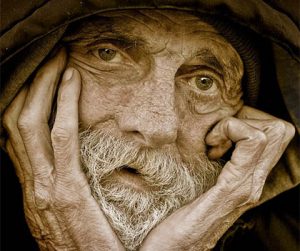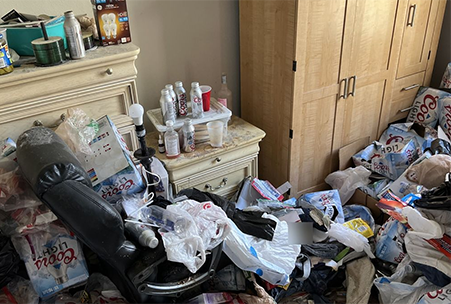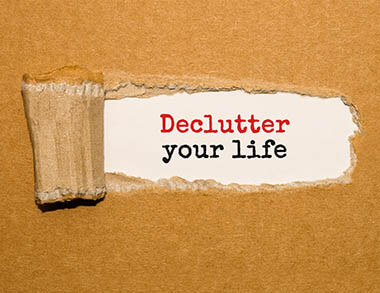Strategies for Helping a Hoarder: Tips for Family Members and Friends
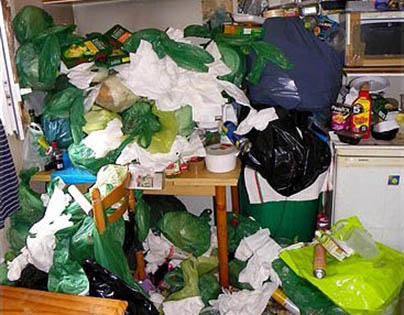
Hoarding is defined as the compulsive tendency to mass-collect miscellaneous items and extreme perceived distress in selling or discarding possessions regardless of their actual value. It is estimated that the issue affects 2-6% of the population. The International OCD Foundation defines signs of compulsive hoarding as the following:
- The compulsive behavior to mass-collect miscellaneous items
- The accumulation of mass clutter in living spaces that result in parts of the home becoming inaccessible
- Extreme distress about the items, especially when discarding the items
Hoarding can be caused by a variety of factors, including genetics, traumatic life events, and mental health issues. Based on how hoarding is covered by mass media, there is a modern perception that poverty causes the behavior. However, as we’ve seen in famous cases such as the Collyer Brothers, the disorder can affect the rich–and the most memorable ones do.
Perhaps in part due to the onset of Diogenese Syndrome in the elderly, the average age of most hoarders is 50. However, anyone at any age can be affected, at any part of their life. It’s not that uncommon to hear about younger cases as well. In fact, research and most stories are about individuals who started collecting following a traumatic event in their life (e.g. death, divorce, or financial hardship). The IOCDF reports that 1 in 50 people have serious symptoms and 1 in 20 have minor to mild symptoms. Hoarding appears to affect mostly first-world countries the most, particularly the United States.
It’s important to intervene, prevent, and treat the problem before the issue escalates. Unresolved issues can lead to very serious hazards, including health problems, structural damage, and fires, all which can lead to death. Other undesirable risks include potential eviction, hospitalization, homelessness, and further isolation and helplessness that can lead to substance abuse.
Signs a Loved One May Be Affected By Hoarding
Most hoarders are secretive about their lives and their collecting habits. They may even isolate or get defensive when asked to visit or for assistance in their home. The reason for this isn’t because they’re “crazy” or “aggressive” just embarrassed over their surroundings. Despite their embarrassment, they feel they cannot stop or escape their situation.
The truth is everyone has collecting tendencies to a certain extent–it’s a part of human nature. Unfortunately, most don’t recognize they have a problem until it’s too late.
If you’re concerned you or a family member are developing early signs of compulsive hoarding tendencies, it may be:
- Collecting items of relatively little monetary or sentimental value (can also be manifested as compulsive shopping tendencies).
- Extreme distress or difficulty parting with collected items.
- Chaotic living spaces as a result of an inability to organize piled possessions.
- Denial, confusion, or general difficulty in reducing or preventing behavior despite distress over their situation.
- Unsanitary or biohazardous conditions as a result of hoarded food, perishable items, and/or human or animal waste.
- The accumulation of pets beyond what the person is able to clean up, feed, and take care of.
- Social isolation due to embarrassment of the living conditions.
- Helplessness as a result of hoarded conditions.
Steps to Help A Hoarder
If you’re a family member suspecting a loved one is struggling, it’s good to inform yourself as best as possible. There is no simple answer as to what may be causing your loved one to hoard. Be aware that unreputable sources may perpetuate a stigma surrounding how there may be overlap with Obsessive-Compulsive Disorder, schizophrenia, depression, substance abuse, and anxiety. While true, it does not mean your loved one should be treated without compassion. It’s also equally important to remember compulsive hoarding can occur without the presence of any mental health illness.
It is important for a family member to be patient and understanding when helping a loved one struggling. Approach the situation with empathy and avoid being judgemental, just as you would for any struggle. This is a complex disorder and it will take time for your loved one to respond to the help. It is essential to provide support and guidance to the hoarder while also respecting their autonomy and decision-making.
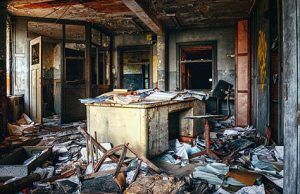
Never attempt to clean up or remediate a severely cluttered home on your own. Professional crews are licensed and equipped to handle these types of situations.
The following strategies appear to be best for helping a loved one struggling:
- Never judge your loved one.
- Be patient, always. They may not be ready to talk about it or receive help. They may also feel overwhelmed when starting treatment. Help them by respecting what they’re feeling and going through – remind them that you’re proud of them and you’re there to support them.
- Encourage them towards realistic, achievable goals, and celebrate with them when they accomplish them. A realistic goal may be to clean the bathroom and discard all old personal hygiene packaging at least once a week. Celebrating can look like treating them to their favorite restaurant or homemade dessert.
- Post-treatment: offer your help sorting and organizing items. It’s important to note that this should be done after they receive treatment. Professional organizers are experienced and familiar with handling these situations to the best ability, even when there are negative confrontations or hostility involved.
- You can help them by getting them organized and in the habit of creating and following a cleanup schedule. Routine cleaning sessions help your loved one stay on track and buffer future relapses.
You can also direct the hoarder to the correct support. There are hundreds of professional organizers and psychologists all throughout the United States. It’s very likely your loved one will be able to find the support they need with a little effort and patience. The key is to simply not give up.
And, if you’re in this situation now and looking for cleaning support, you can absolutely call us. The National Crime Scene Cleanup (NCSC) is a nationwide biohazard cleaning company that helps hundreds of hoarders a year and would be more than happy to help you with your loved one. Call our discrete, 24/7 emergency hotline any time you need hoarding cleanup assistance.


